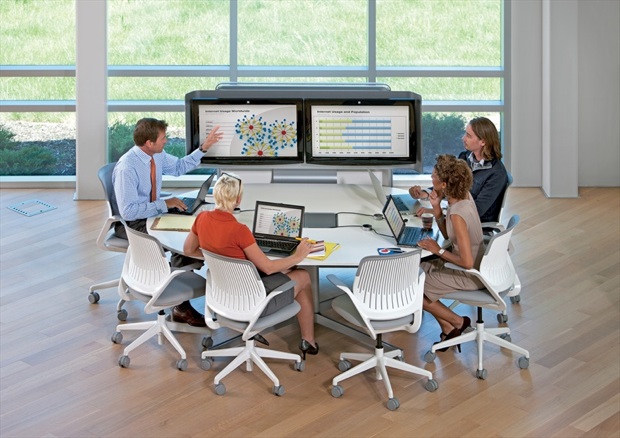Steelcase turns 100, asks big thinkers to predict the next century


Steelcase, the Michigan-based maker of sleek and inventive office furniture, is having a banner year so far. It was named as one of Fortune magazine's "Most Admired Companies" (in the Home Equipment and Furnishings category). But there's even more to celebrate: the company turned 100 this month (March 16, to be exact).
And being a design-centered corporation known for its creativity, its marketing team came up with a thought-provoking way to mark its centennial: Steelcase asked 100 thought leaders from around the world to envision what life will be like a century from now.
"From the start, our company has been about more than furniture," James Hackett, CEO of Steelcase, said in a press release. "We have always focused on people and what people can do. Companies don't survive for a century – ideas do." So the project, in some ways, reflects on Steelcase's identity as a strong source for innovation research, too.
(In fact, Steelcase publishes white papers and a magazine on workplace and education design, and hosts panels with top thinkers on such subjects--I had the honor of moderating one with best-selling author Daniel Pink (A Whole New Mind and Drive), Steelcase president Jim Keane, and Rotman School of Management dean Roger Martin last year).
The 100 Minds site, as the online venue for this new collection of Steelcase-curated future predictions is called, looks and reads kind of a like a Facebook News Feed of a very influential person. There are short postings by marquee names ranging from Paola Antonelli, senior curator of Architecture and Design at the Museum of Modern Art, to Jamie Dimon, chairman and CEO of JP Morgan Chase. Some read like concise punditry, others like poetic aphorisms. Some are very specific and optimistic, or even potentially creepy, depending on your point of view.
Here are a few highlights (in terms of big names or big-think ideas featured):
Daniel Pink, author: "Forget fanciful, futuristic forecasts. Give more people the freedom to dream--and the future will take care of itself."
Tim Brown, president and CEO of IDEO: "In 100 years, machines may manage the economy, not economists or politicians."
Barry Rabner, president and CEO of Princeton HealthCare System: "Imagine. Companies will produce embryos for implantation made from engineered DNA which will yield physically and mentally enhanced, disease-resistance people."
Jamie Dimon, Chairman of the Board and CEO of JP Morgan Chase: "No one can predict the future with any certainty. But I look forward to the day when the United States of America gets its mojo back--and it's not 100 years away, either."
John Maeda, president of the Rhode Island School of Design: "We think having Google at our disposal has changed how we think about knowledge retention, but imagine when that knowledge is literally integrated into your being."
Paola Antonelli, senior curator of Architecture and Design, Museum of Modern Art: "In 100 years, design will be at the center of things, a benign and necessary force in all facets of human experience."
Roger Martin, dean of the Rotman School of Management at the University of Toronto: "We have to rethink how we utilize workers in our advanced economy."
Tod Machover, professor and composer, MIT Media Lab: "Creative collaboration between experts and everyone else is the key to cultural vitality in the future."
Yes, the site and its outsourced opinions offer an unusual twist to a corporate anniversary celebration. While Steelcase uses the site to herald its past, providing third-party predictions on the future, too, is a smart and playful strategy. It positions the corporation as a well-respected, well-connected thought leader in both design and business.
Photo: Steelcase
This post was originally published on Smartplanet.com